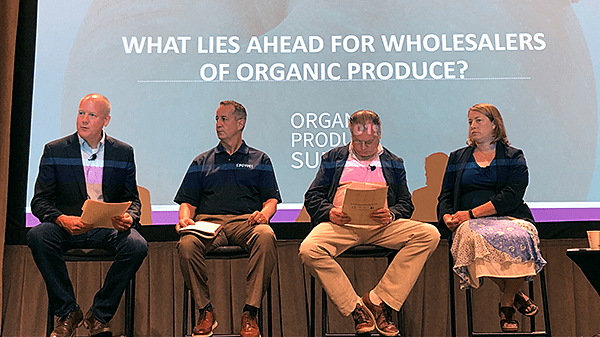From left: Mark Munger of 4Earth, Greg Kurkjian of Crosset Co., Mark Hill of Baldor Specialty Foods and Elizabeth Nardi of Organically Grown Co. discuss wholesale trends at the Organic Produce Summit in Monterey, July 11.
MONTEREY, CA—With retail customers increasingly moving toward self-distribution, wholesalers remain a vital piece of the fresh produce supply chain.
That’s even more important when it comes to organics.
A trio of organic produce wholesalers from across the U.S. gave their perspective on the state of the industry, from the wholesaler’s view, at the Organic Produce Summit on July 11.
Kale, they said, appears to have peaked.
“What a run it was,” said Mark Hill, Director of Organic Produce for Baldor Specialty Foods, New York BB #:121770. “Twenty years ago, kale was a garnish on salad bars. Now it’s one of the biggest commodities in organic distribution.”
Greg Kurkjian, Vice President and General Manager of Crosset Co. LLC, Independence, KY, BB #:102407, agreed. He said other cooking vegetables are hot right now, particularly because of plant-based diets.
“Now we have celery to deal with,” he said. “Cooking veg is really spiking right now, and I’m not talking about potatoes. Items like broccoli, cauliflower, asparagus and Brussels sprouts are pretty good trends in organic.”
Elizabeth Nardi, CEO of Organically Grown Co., Eugene, OR, BB #:149476 said her company has been helping growers look into alternative items like purple broccolini as both a specialty and differentiator, but also a valuable rotation crop for organic production.
“We’re seeing our role in the supply chain more creating a culture of community,” she said.
For Crosset Co., it takes differentiation to keep wholesalers relevant as more retailers go into self-distribution of organic produce. One way to do that is to offer a more diverse assortment.
Wholesalers help growers reach a broader audience as well.
“That’s where I come into play,” he said. “We make that buying very simple. We have a niche where we can work with smaller local growers and pull their resources together and make it an easier path for the retailer.”
It takes skill to bring many of these specialty items to market, Hill said, and its more time and effort than many buyers have to devote to a niche item.
“We welcome and embrace new items. “Not many wholesalers have the skill that we do to bring these to market.”
MONTEREY, CA—With retail customers increasingly moving toward self-distribution, wholesalers remain a vital piece of the fresh produce supply chain.
That’s even more important when it comes to organics.
A trio of organic produce wholesalers from across the U.S. gave their perspective on the state of the industry, from the wholesaler’s view, at the Organic Produce Summit on July 11.
Kale, they said, appears to have peaked.
“What a run it was,” said Mark Hill, Director of Organic Produce for Baldor Specialty Foods, New York BB #:121770. “Twenty years ago, kale was a garnish on salad bars. Now it’s one of the biggest commodities in organic distribution.”
Greg Kurkjian, Vice President and General Manager of Crosset Co. LLC, Independence, KY, BB #:102407, agreed. He said other cooking vegetables are hot right now, particularly because of plant-based diets.
“Now we have celery to deal with,” he said. “Cooking veg is really spiking right now, and I’m not talking about potatoes. Items like broccoli, cauliflower, asparagus and Brussels sprouts are pretty good trends in organic.”
Elizabeth Nardi, CEO of Organically Grown Co., Eugene, OR, BB #:149476 said her company has been helping growers look into alternative items like purple broccolini as both a specialty and differentiator, but also a valuable rotation crop for organic production.
“We’re seeing our role in the supply chain more creating a culture of community,” she said.
For Crosset Co., it takes differentiation to keep wholesalers relevant as more retailers go into self-distribution of organic produce. One way to do that is to offer a more diverse assortment.
Wholesalers help growers reach a broader audience as well.
“That’s where I come into play,” he said. “We make that buying very simple. We have a niche where we can work with smaller local growers and pull their resources together and make it an easier path for the retailer.”
It takes skill to bring many of these specialty items to market, Hill said, and its more time and effort than many buyers have to devote to a niche item.
“We welcome and embrace new items. “Not many wholesalers have the skill that we do to bring these to market.”
Pamela Riemenschneider is Retail Editor for Blue Book Services and also is over kale.



